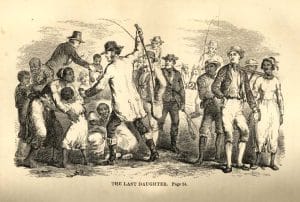Let’s be clear: It is “highly unlikely” an Immigration and Customs Enforcement agent would actually have a judicial warrant granting them access to a school or classroom to haul away a child – even if the Trump administration believes that all undocumented immigrants “are criminals.” But that might not stop them from trying to gain access to schools anyways.
That’s part of the reason why the ACLU of Pennsylvania and the Education Law Center sent letters to school districts across Bucks County and throughout Pennsylvania: to cut through the noise and clear up any confusion about what schools are legally obligated to do if an ICE agent comes knocking.
The letter was crafted in response to the escalation of anti-immigrant rhetoric and policies pushed by the new administration immediately following Donald Trump’s inauguration. Specifically, the letter addresses the Department of Homeland Security’s announcement that it was rescinding the Obama-era policy that declared “sensitive areas” such as schools, churches, and hospitals were off limits to ICE raids and actions. This policy ensured immigrants’ safe access to basic services and support. But now its removal leaves communities worried whether parents might be snatched by ICE agents while dropping their kids off at school, or whether students could be ripped from classrooms or taken from school playgrounds. This is also important because ICE agents as official policy have used “ruses,” or lies, to obtain information, lure targets outside, and to make arrests. Nevermind there are concerns about whether districts have proper policies and procedures in place to stop things like this from happening.
“The end of the ‘sensitive locations’ policy … makes it more likely that immigration enforcement operations will occur at schools, targeting your students or their family members when they come to schools,” the letter notes. “Therefore, it is critically important for schools to understand both students’ rights and schools’ responsibilities.”
It also included a model “Welcoming Schools” resolution for school boards to draft and pass along with a list of best practices for school districts to follow when developing their own policies.
But here in Central Bucks School District, many families feel like the relationships they have built with teachers provides a degree of safety.
“There is a strong bond and rapport between many parents, students, and their teachers. Most educators just want to make sure that their students feel safe enough that they can learn,” said Heidi Roux, Executive Director of Immigrant Rights Action.
While some school districts across Bucks County are still finalizing their procedures, last week Central Bucks issued a statement on how the district will handle ICE raids.
In the letter, Superintendent Steven Yanni stated that the district “provided step-by-step guidance for our administrators in the event of an on-campus interaction with ICE officials,” which is also available to staff. He noted the district doesn’t keep any records of students’ or their families’ immigration statuses and that “our procedures prioritize the safety, privacy, and rights of our students and their families, and seek to maintain a calm and respectful environment.”
But, many in the community felt that the District’s statement did not go far enough in reassuring local families that CBSD would support its immigrant families.
The bottom line is that each school district has the responsibility to protect its students’ rights. As the ACLU PA and Education Law Center letter notes:
“Schools must protect students’ rights, including their Fourth Amendment rights against unreasonable searches and seizures, their Fifth Amendment right against self-incrimination, and their privacy rights under Family Educational Rights and Privacy Act (FERPA) and many other laws.”
READ: The Dangerous Depravity of Trump ‘Border Czar’ Tom Homan
Days after the district’s initial letter, Central Bucks issued a new, more detailed correspondence with parents describing actions that are being taken.
Dr. Yanni explained in this email that the District will not allow ICE officials into the school without a valid judicial warrant, something most ICE agents have failed to obtain:
“ICE officials must present a valid judicial warrant to access any area of our schools or buildings beyond the main office or reception area. All other areas are strictly off limits without a valid judicial warrant. A valid judicial warrant is also required for ICE officials to seek out students or staff whom they suspect may be undocumented. No other type of warrant permits them to do so.
ICE officials cannot enter a private area with an immigration warrant or an administrative order unless given consent by a member of the district’s Leadership Team. Our Leadership Team will not consent to ICE officials accessing students and staff with this type of documentation.”
Keith Armstrong, the ACLU of PA’s immigrants’ rights attorney, explained how schools can determine if ICE should be permitted into the building.
“If ICE shows up with a valid judicial warrant, then there is a legal requirement to let them in. But, ICE rarely obtains judicial warrants for immigration enforcement actions,” said Armstrong. “So it is highly unlikely they would have a judicial warrant when they show up at a school. We are mostly talking about children here.”
“The administrative warrants that ICE tries to use merely say that they suspect someone to be in violation of an immigration civil statute. That doesn’t entitle them to enter a private place in a school. It’s important to remember that the Fourth Amendment is still in place, and that it still protects students, regardless of immigration status, from unlawful searches and seizures,” he added.
Armstrong noted that many districts, including Central Bucks, have already laid out protocols for how to handle ICE raids.
“The Central Bucks School District policy has room for improvement but it looks like it has a good chain of command to inform the superintendent and legal department before a decision is made,” he said. “It is important to have clear practices that district employees are trained on.”
Armstrong noted the importance of providing training to anyone who could potentially interact with ICE on behalf of the schools, including teachers, contractors, vendors, consultants, volunteers, and school security officers. He recommended that staff involved in an ICE raid take extensive notes on the interaction to assist in any future legal action. Armstrong also stressed the importance of not keeping school records of any information that would reveal a student’s immigration status.
Armstrong said that the Family Educational Rights and Privacy Act (FERPA) provides another layer of protection for students.
“The Family Educational Rights and Privacy Act regulates access and disclosure of student information and records,” said Armstrong. “FERPA limits the circumstances in which someone can disclose information that’s contained in a student’s school record. Usually the information can only be given to a parent of a minor child, a student who is 18 or over, or with consent from parent or adult student.”
Kristina Moon, Senior Attorney at the Education Law Center, noted that despite the rhetoric from the Trump administration, the laws haven’t changed.
“The federal court case Plyler V Doe in 1982 established all students’ rights to attend school where they live regardless of immigration status, and there’s been no revision to statutes that protect all students against discrimination based on national origin,” said Moon. “Those are changes that an executive order cannot undertake on its own.”
While the law hasn’t changed (yet), the focus on deportation has sharply increased with the Trump Administration – which has promised “the largest mass deportation program in history.” ICE officials seem to be relying on the general public’s lack of information on immigration law to conduct raids in schools and other semi-private facilities. By educating school staff on students’ rights and creating a plan of action for ICE raids, Central Bucks School District is taking an important step in protecting our immigrant families. Other Bucks County School districts must follow suit.
ACLU of Pennsylvania and Education Law Center Letter
The Welcoming Schools Best Practices Document







